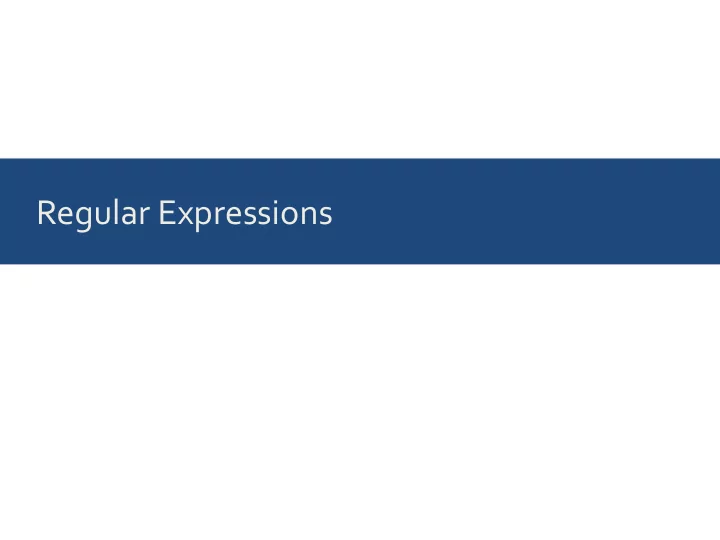

Regular Expressions
Simple matching and searching String: My name is Claus Regex: My name is
Simple matching and searching String: My name is Claus Regex: My name is Match: My name is Claus matched part unmatched part of string of string
Simple matching and searching String: My name is Claus Regex: My age is
Simple matching and searching String: My name is Claus Regex: My age is Match: Does not match!
Commonly used special symbols in Python regular expressions Symbol Meaning . matches any character + 1 or more * 0 or more () capture group \d digit \D non-digit \s whitespace \S non-whitespace \w alphanumeric \W non-alphanumeric ^ beginning of string $ end of string
Commonly used special symbols in Python regular expressions Symbol Meaning . matches any character + 1 or more * 0 or more () capture group \d digit \D non-digit \s whitespace \S non-whitespace \w alphanumeric \W non-alphanumeric ^ beginning of string $ end of string
. matches any character, + means one or more String: My name is Claus Regex: My .+ is
. matches any character, + means one or more String: My name is Claus Regex: My .+ is Match: My name is Claus
. matches any character, + means one or more String: My is Claus Regex: My .+ is
. matches any character, + means one or more String: My is Claus Regex: My .+ is Match: Does not match!
* means zero or more String: My is Claus Regex: My .* is
* means zero or more String: My is Claus Regex: My .* is Match: My is Claus
Commonly used special symbols in Python regular expressions Symbol Meaning . matches any character + 1 or more * 0 or more () capture group \d digit \D non-digit \s whitespace \S non-whitespace \w alphanumeric \W non-alphanumeric ^ beginning of string $ end of string
Capture groups String: My name is Claus Regex: My name is (.+)
Capture groups String: My name is Claus Regex: My name is (.+) Match: My name is Claus Group 1: Claus
Commonly used special symbols in Python regular expressions Symbol Meaning . matches any character + 1 or more * 0 or more () capture group \d digit \D non-digit \s whitespace \S non-whitespace \w alphanumeric \W non-alphanumeric ^ beginning of string $ end of string
Capture groups String: My name is Claus Regex: My name is\s+(\S+) Match: My name is Claus Group 1: Claus
Try it yourself http://pythex.org/
Regular Expressions in Python
Digression: Raw strings In [1]: print("line1\nline2") Out[1]: line1 line2 How can we print out " line1\nline2 "? In [2]: print("line1\\nline2") # escape the backslash Out[2]: line1\nline2 Simpler alternative: use a raw string In [3]: print(r"line1\nline2") # r stands for raw Out[3]: line1\nline2
The key regex function we will use is re.search() In [1]: import re # load regular expression module test_string = "My name is Claus" match = re.search(r"name", test_string) if match: # did we find a match? print("Test string matches.") print("Match:", match.group()) Out[1]: Test string matches. Match: name
match.group() returns the part of the string that matched In [1]: test_string = "My age is secret." match = re.search(r"My \S+ is", test_string) print(match.group()) Out[1]: My age is In [2]: test_string = "My mood is good." match = re.search(r"My \S+ is", test_string) print(match.group()) Out[2]: My mood is
match.group() also recovers any captured groups In [1]: test_string = "My age is secret." match = re.search(r"My (\S+) is (\S+)", test_string) print("Match:", match.group(0)) print("Captured group 1:" , match.group(1)) print("Captured group 2:" , match.group(2)) Out[1]: Match: My age is secret. Captured group 1: age Captured group 2: secret.
Recommend
More recommend